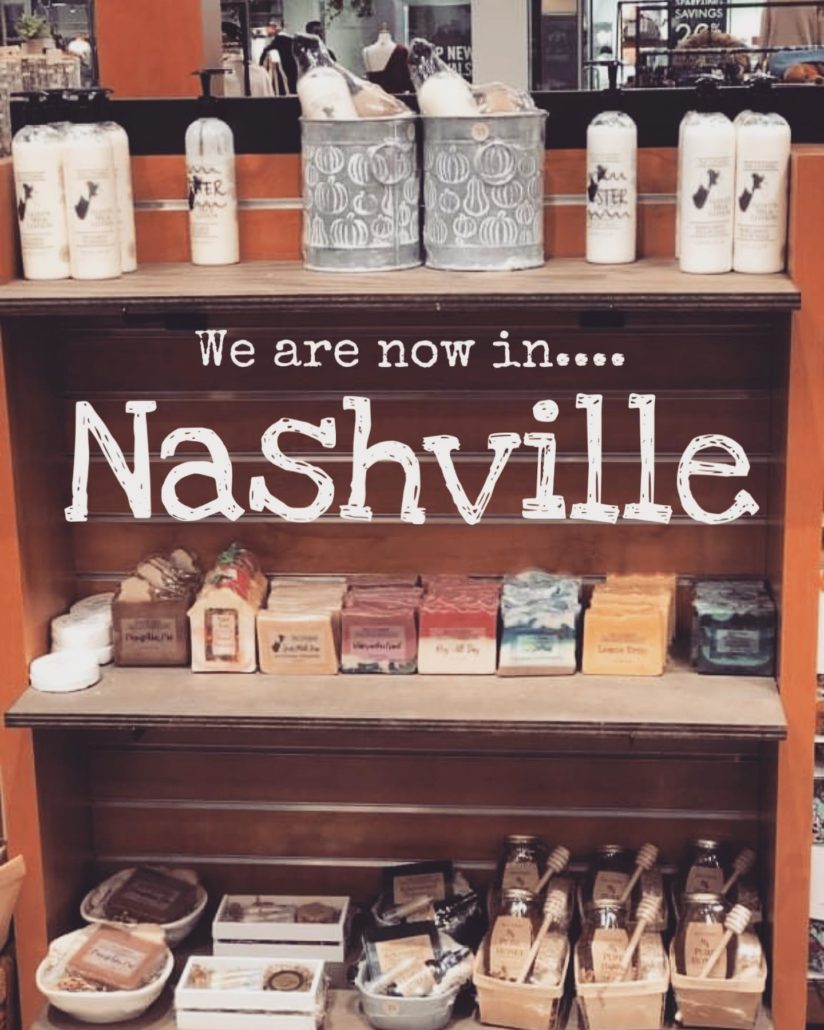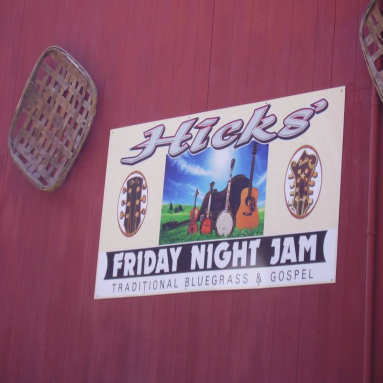Perched on a hill just off Little Duck Road in Nickelsville is B2C2 Farms, from where fertilized chicken eggs and chicks are shipped throughout the United States. What started as a challenge for Courtney Farmer from her husband, Ben, in 2016, has grown into a successful farm operation for the family.
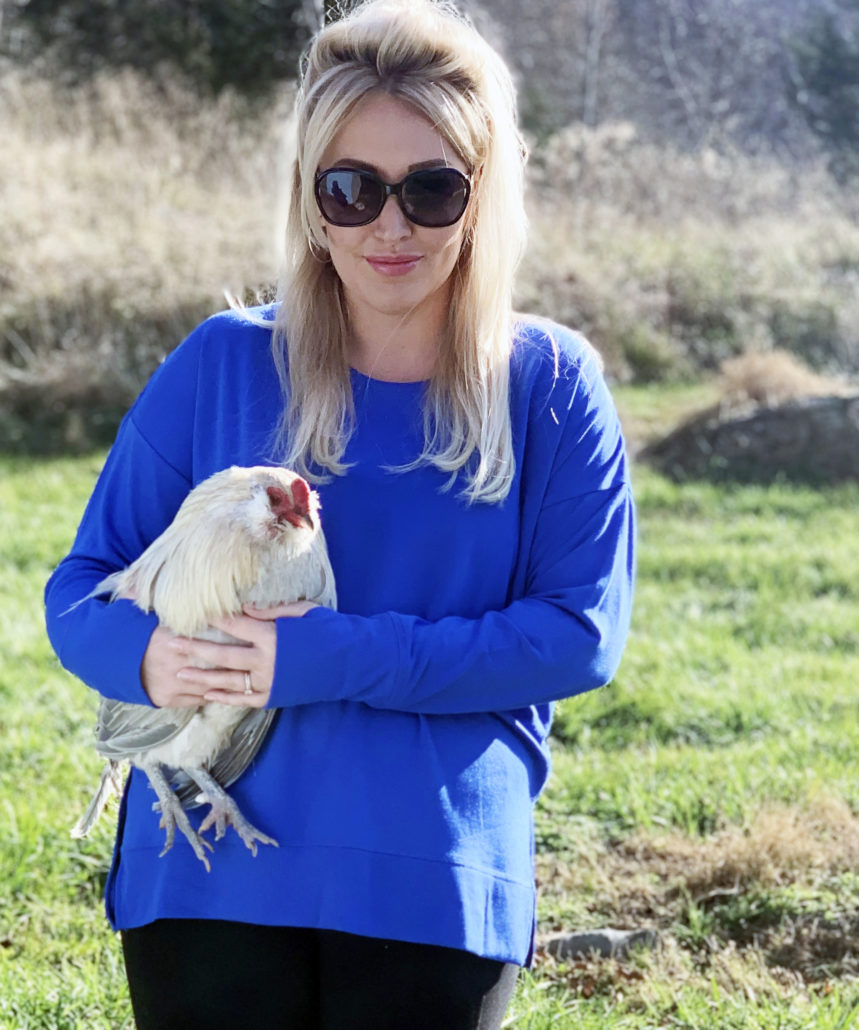
As Ben and Courtney’s family began to grow, they started looking for a new home. Ben works full-time as a MedFlight helicopter pilot for Virginia State Police and Courtney works as a payroll specialist for Lonesome Pine Dining in Big Stone Gap. As a MedFlight pilot, Ben could live no further than 25-miles from the State Trooper base in Abingdon.
The mountain-chalet-style home on Little Duck turned out to be the exact distance between both Ben and Courtney’s jobs. When the couple first looked at the house, there were six chickens living in a coop near the house. When the Farmers moved into their home a month later, there were only four chickens left—two chickens and two roosters.
“The roosters would get up every morning and troll the yard for cat food,” Courtney said. “The hens were still up in the shed, but I just figured they were too old to lay. I didn’t know a thing about chickens,” she laughs.
Courtney did not know the chickens were molting and did not lay eggs in the late fall and early winter. To her surprise, one day when checking the chickens, she found two eggs. Courtney immediately ordered an incubator and hatched her first chick, Beulah, a rooster. “Even though she’s a rooster, we still call her Beulah.”
Then to her surprise, there were 20 more eggs so the Farmers ordered an even bigger incubator and hatched 23 chicks. The Farmers spent about $900 to extend the initial chicken run, which also required the pen to be varmint and eagle proof. That’s when Ben told Courtney “these chickens better pay off.” Courtney thought about it, and said, “Okay, I’ll see what I can do.”
Courtney wanted to raise high quality stock. She researched chickens and picked the ones she wanted to raise for both meat and laying purposes. She settled on Lavender Wheaten (Isabel) Ameraucana, Black Copper Marans, Silver Double Laced Barnevelder, American White Bresse and Lavender Cuckoo Orphington.
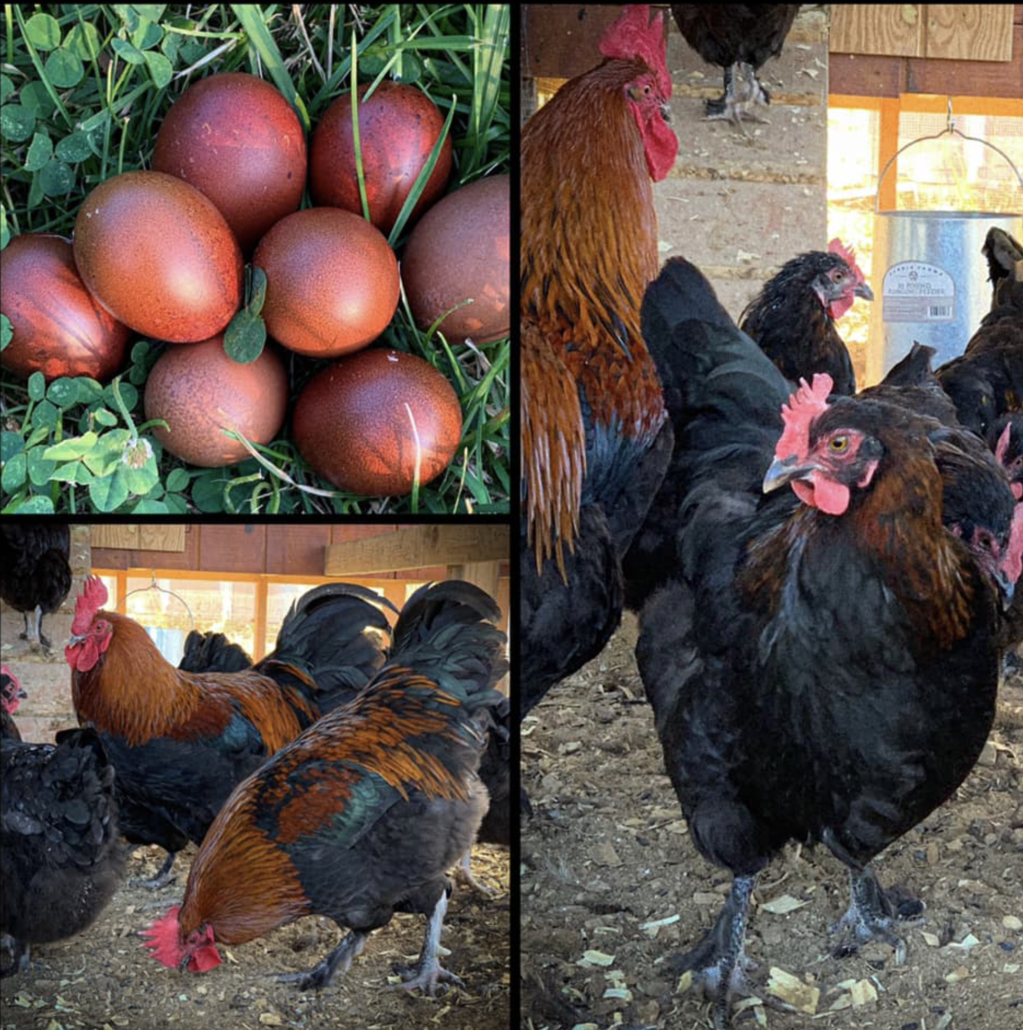
She did not grow up on a farm, nor have a “Chicken Mentor,” or know chicken math. “It’s like you see one (chicken breed) that you like, so you buy one and then you think, well another won’t hurt, and the next thing you know, you’ve got 40 to 50 chickens running around.”
And she readily admits, she is a self-taught breeder. “It took a lot of googling, trial and error, and hard work to get the process right.”
In order to sell and ship fertilized eggs and/or chicks, a breeder must have a poultry tester come in and certify that the chickens are disease-free. Unfortunately, there is not a tester in this area so Ben and Courtney had to become N-PIP (National Poultry Improvement Program) certified. This enabled the Farmers to test their own poultry. This certification also allows the Farmers to test poultry at other farms. The poultry industry is pretty strict, and every six months, the farm must additionally send 30 eggs to Harrisonburg to be tested for avian bird flu.
The prices for fertilized eggs and chicks depend on the breed. A full list of prices can be found at the website at www.b2c2farms.com
Courtney takes great care in preparing her eggs and chicks for shipment. “After collecting the eggs, I place them pointy side down, and rotate the eggs three-to-five times per day by elevating one side of the tray.
“I don’t like to ship eggs older than three to five days. Hatching eggs have a shelf life of ten days before they become less viable. I also periodically crack eggs, which we will then eat, to spot check fertility.” She is looking for a bullseye in the yolk to know if it’s a fertilized egg. If fertility is less than 80 percent, then Courtney will not sell that breed’s eggs until it performs better.
Her goal is to “ensure that each customer has the freshest, most viable eggs possible.” Eggs take a beating during shipment so Courtney individually wraps each egg in bubble wrap and fits 16 eggs into a medium-size box, layered with reflective insulation. Eggs are shipped pointy-side down. This box then goes into a larger box, surrounded by bubble wrap.
Day-old chicks are sent via “chick shipping boxes,” with substrate pads, “72-hour heat pack” and “gro gel” in cups to provide hydration and nutrients if the chicks get delayed in route. According to Courtney, “all chicks—even ones purchased from farm stores—travel via the postal service from a hatchery the day they hatch.” This is safe because chicks don’t need food or water for 72 hours after hatching. All products are shipped with the required NPIP paperwork for state inspection.
Once Courtney felt successful with this part of the farm operation, she decided to add goats. At first, Ben was reluctant. “I had also started making soap, and wanted to add goat’s milk to the soaps.” And she also wanted to breed the goats so she decided to buy both Nubian and Nigerian Dwarf goats. Aside from the milk, the goats have been proficient in keeping the hillside area around the home clean.
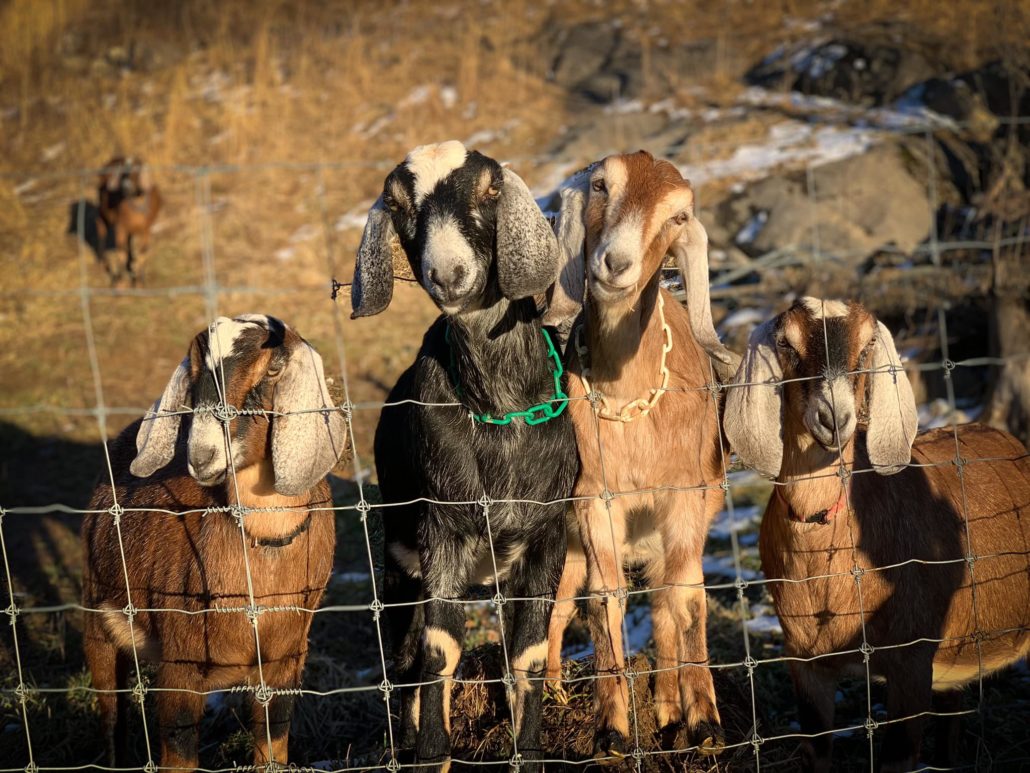
Nubian goats are a dual-purpose – good for both meat and milk. With their Middle-Eastern heritage, they can also live in hot climates and have a longer breeding season than other dairy goats. According to Courtney, her Nubians breed August through January, and only have one to two babies. Nigerian dwarfs on the other hand are much smaller and breed all year long and produce five to six babies. Nubians’ milk has a high butterfat yield in the milk and are great for large scale milk production.
The milk of Nigerian Dwarf goats also has a large butterfat content, and their small size make them great 4H and FFA projects, or simply to have as family pets.
Today, she has 14 goats, named Wisteria (the first goat and also the farm’s “drama queen’), Chloe, Opal, Jolene (Opal’s baby), Dolly (Opal’s baby), Topaz, Patsy Cline (Topaz’s baby), Loretta Lynn (Topaz’s baby), Pink Cashmere, Johnny Cashmere (Pink’s baby), Rosanne Cashmere (Pink’s baby), June Cashmere (Pink’s baby), Royal Oak, and Charlie.
Goats require milking twice a day and often produce a gallon per day. A large amount of the milk is fed back to the baby goats. The remainder, Courtney freezes and uses in future batches of soap and lotions. And yes, baby goats, especially the newbies, have been known to roam around inside the Farmers’ home.
Along with the chickens and goats, the Farmers also sell cattle and raise bees for honey. Courtney also makes beautiful artisan soaps (some of which look good enough to eat), lotions made from goats milk, honey, plus lip balms, soaps and lotions made with honey, as well as seedless blackberry jam. Due to honey production, all bee-related products are seasonal.
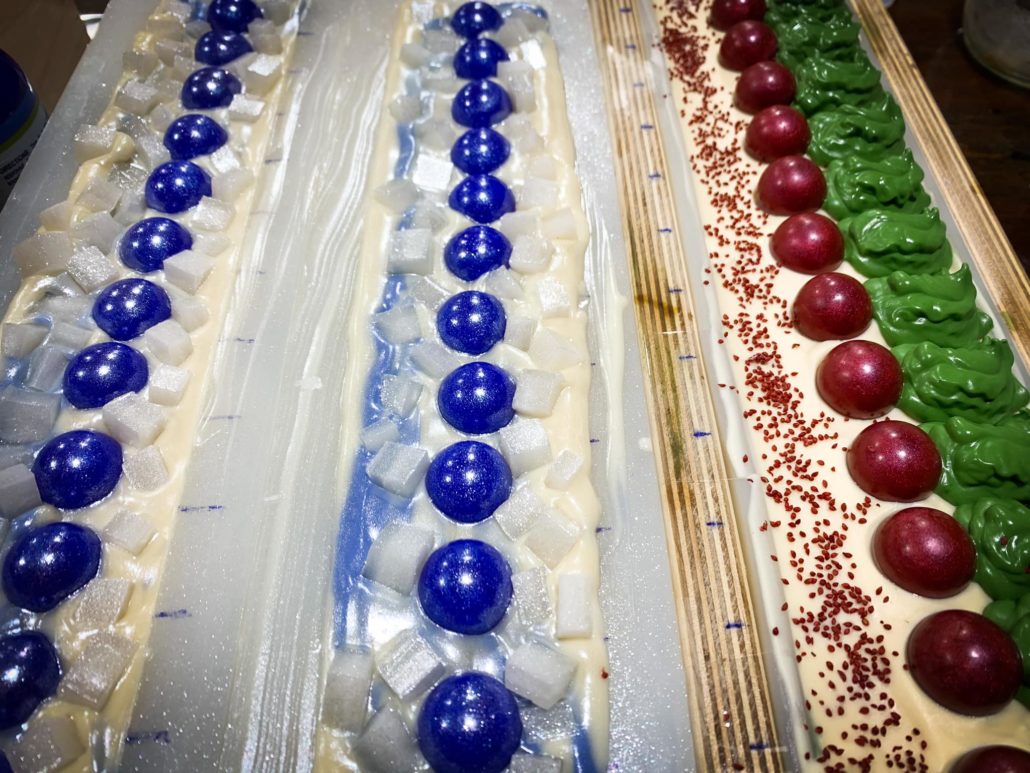
The entire Farmer family, Ben and Courtney, plus children, Bridgette, 9, Callan, 4, and Cameron, 2, work on the farm. And the Farmers try to establish a normal routine around all that goes with raising children and running a farm operation. Courtney readily admits, however, there is never a typical day.
“We play it by ear,” she says. Due to her husband’s work schedule, Courtney is the only parent present to care for the family and farm. “I like to think of it as if everyone on the hill is fed, watered, clean, and alive, we had a good day.”
To stay on top of the farm activities and business, Courtney tries to implement a schedule. “We may focus on cleaning pens on one day, trim hooves the next, make soap, or order supplies. You just have to keep each task in mind, plan it, and set a day.”
Depending on the time of year, schedules often get flipped. “February to June is typically chick season. January to June is egg season. April and May will be kidding season. Calves are year-round. Honeybees are checked three times per year, and the Farmers take a day in June and August to harvest honey. Festival season begins in October, but they need to start preparing in June.
“It’s hard work and a lot of keeping track, but when you see it and live it every day, you begin to know what needs to happen next.”
During the fall months, you can find B2C2 farms at local festivals, such as the Apple Festival in Unicoi County, Tennessee or Mountain Empire Home Craft Days in Big Stone Gap. All products can be purchased from the website, www.b2b2farms.com or in stores like the Appalachian Mercantile in Appalachia, or at the Urban Market in Nashville, Knoxville, and coming soon to Johnson City, Tennessee.
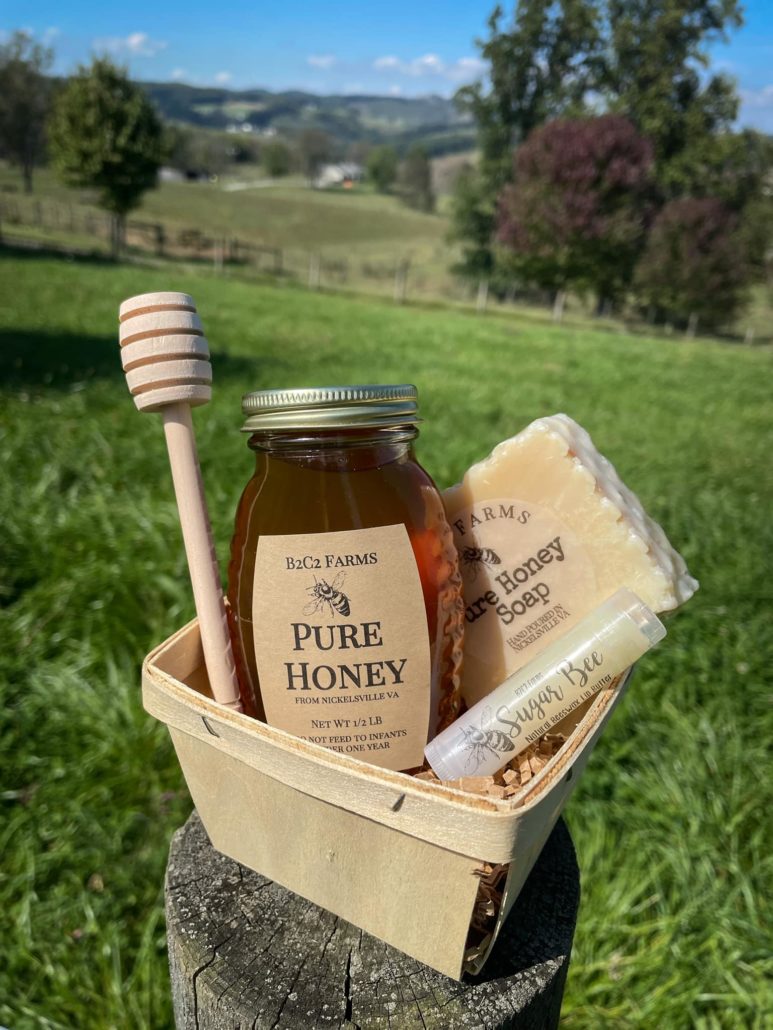
Over the years, the $900 investment for the bigger chicken run has paid off. “We kept expanding with our chicken breeds to where our eggs became more sought after.” Naturally, there have been a few setbacks over the years. But between the chickens, cows, goats, honeybees, and soap, the business has come together for the Farmers and is paying its way.
The knowledge gained, however, Courtney says has been “invaluable.” And this spring, she’s willing to pass along that knowledge to others. The Farmers are currently building a soap-making room for Courtney’s operation. She plans on teaching lessons, and with prior notice, even open the farm up for tours and instruction in chicken and goat breeding.
To contact Courtney, email her at b2c2farms@hotmail.com or call 276.393.3841.
